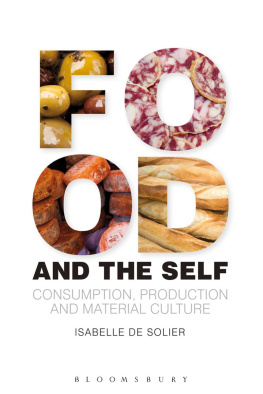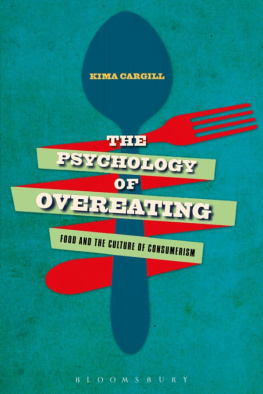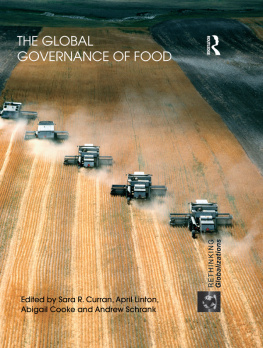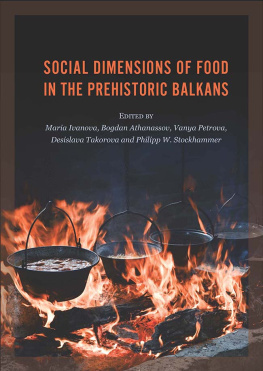First published 2010 by Ashgate Publishing
Published 2016 by Routledge
2 Park Square, Milton Park, Abingdon, Oxon OX14 4RN
711 Third Avenue, New York, NY 10017, USA
Routledge is an imprint of the Taylor & Francis Group, an informa business
Copyright Bente Halkier 2010
Bente Halkier has asserted her right under the Copyright, Designs and Patents Act, 1988, to be identified as the author of this work.
All rights reserved. No part of this book may be reprinted or reproduced or utilised in any form or by any electronic, mechanical, or other means, now known or hereafter invented, including photocopying and recording, or in any information storage or retrieval system, without permission in writing from the publishers.
Notice:
Product or corporate names may be trademarks or registered trademarks, and are used only for identification and explanation without intent to infringe.
British Library Cataloguing in Publication Data
Halkier, Bente.
Consumption challenged : food in medialised everyday lives.
1. Food consumption. 2. Food consumption--Research. 3. Nutrition surveys. 4. Food consumption--Environmental aspects. 5. Food habits. 6. Food consumption--Denmark--Case studies.
I. Title
339.486413-dc22
Library of Congress Cataloging-in-Publication Data
Halkier, Bente.
Consumption challenged : food in medialised everyday lives / by Bente Halkier.
p. cm.
Includes index.
ISBN 978-0-7546-7476-4 (hardback) -- ISBN 978-1-3155-7375-5 (ebook)
1. Food preferences. 2. Food consumption--Social aspects. 3. Consumer education--Social aspects. 4. Food habits--Social aspects. 5. Food--Social aspects--Denmark--Case studies. I. Title.
TX357.H26 2010
394.1209489--dc22
2010011715
ISBN 9780754674764 (hbk)
ISBN 9781315573755 (ebk-PDF)
ISBN 9781317161073 (ebk-ePUB)
Preface
This book is intended to participate in discussions about the agency of ordinary food consumers: What can ordinary consumers do about societal problems such as the climate challenge and the obesity epidemic? A central analytical contention of this book is that nowadays food consumption routines become questioned via media campaigns and debates, and that such discourses typically individualise and privatise the responsibility for doing something about problems such as the environment and health. Therefore it is possible to see food consumption as challenged. The primary aim of this book is to provide empirical analyses of the varieties and complexities of how people respond to such contestations as consumers in their everyday lives. Thus, the arguments comment upon discussions about political consumption as well as discussions about communication for social change. Another of the aims of the book is to build more bridging between the sociology of consumption and user-oriented communication research.
This book is written from a particular theoretical perspective that highlights the performative character of social life and argues against methodological individualism as well as analytical structuralism. Practice theory has been discussed intensely among European sociologists researching consumption and consumer cultures in recent years, and yet another aim of this book is to discuss the usefulness and the implications of a practice theoretical perspective in consumption research.
Perhaps we associate the writing of a book with long lonely hours of struggle in front of the computer. In fact, writing a book is an inherently social process where many people should be thanked for their participation and contributions.
First of all, writing a book that is mainly empirical requires empirical data materials. I would like to thank all the people who have volunteered to be interviewed, to participate in focus groups, and to take photos of their food and cooking over the years. Without your generous spending of time and energy, it would not be possible to do empirical research on food consumption issues, and I am thoroughly grateful for your participation and our dialogues. Likewise, writing a book based on empirical research requires financed time. Thus, I would like to thank the Department of Communication, Business and Information Technologies at Roskilde University, the National Danish Strategic Environmental Research Programme and the National Danish Social Scientific Research Council (FSE) for financing some of this research and writing time. Furthermore, one of the empirical research projects has been carried out in partnership with my good colleague Iben Jensen at the Department of Communication, Business and Information Technologies, Roskilde University. Much thanks to you for inspiring and dynamic cooperation.
Writing a book begins with vague ideas that are developed over cups of tea in front of the computer and with the cat snoozing on the sofa. But the ideas certainly also develop through sharing, discussion and reflection with others. I am thoroughly grateful to Neil Jordan from Ashgate for suggesting the idea of writing such a book to me back at the 2007 European Sociological Association Conference in Glasgow. Likewise, I would like to thank Jukka Gronow, Alan Warde and two referees for commenting on the book proposal. The actual writing of bits and pieces of the manuscript has in particular benefitted from my participation in five academic settings: The Research Network on Sociology of Consumption under the European Sociological Association; the Nordic network on consumers and sustainability; my own research group, Knowledge production and Communication; other colleagues at the Department of Communication, Business and Information Technologies, Roskilde University; and the sociology group at the Department of Human Nutrition, Copenhagen University. Many national and international colleagues have provided useful comments and reflections for different parts of the book at different stages. Without any other order than an alphabetical one, I would like to express my gratitude to: Pernille Almlund, Nina Blom Andersen, Magnus Bostrm, Tim Dant, Arne Dulsrud, David Evans, Kirsten Gram-Hanssen, Jukka Gronow, Henrik Halkier, Tom Hargreaves, Pernille Hohnen, Lotte Holm, Iben Jensen, Katherine ODoherty Jensen, Sisse Siggaard Jensen, Tally Katz-Gerro, Margit Keller, Unni Kjrnes, Mikael Klintman, Sanne Knudsen, Jesper Lassen, Johanna Mkela, Lydia Martens, Mara Miele, Annemette Nielsen, Birgitte Ravn Olesen, Christina Hee Pedersen, Karsten Pedersen, Louise Phillips, Ursula Plesner, Inge Rpke, Kim Schrder, Dale Southerton, Gert Spargaaren, Pl Strandbakken, Eivind St, Pekka Sulkunen, Laura Terragni, Lisbeth Thorlacius, Harald Throne-Holst, Monica Truninger, Gunnar Vitters, Alan Warde, Terhi-Anna Wilska, Mark rsten, and Per stergaard.
Some people have taken the time to read and comment upon whole chapters, and I thank Nina Blom Andersen, Henrik Halkier, Iben Jensen and Per stergard for this. But I am particularly indebted to Lotte Holm and Alan Warde who spent their time and academic energy on reading the entire manuscript. Without your heroic efforts and constructive suggestions, the arguments in this book would have been considerably less clearly presented. The same type of thanks go to my English language editor, Marianne Stein. Also, I would have never completed the book without the consistent enthusiasm and optimism of my editor at Ashgate, Neil Jordan. All shortcomings of the book are, of course, my responsibility.






